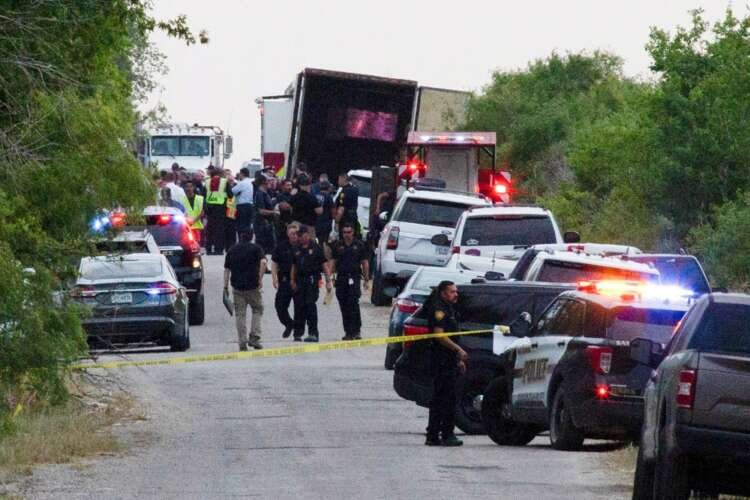As business booms for people smugglers using trucks in Texas, risks grow


By Ted Hesson, Laura Gottesdiener and Kristina Cooke
By Ted Hesson, Laura Gottesdiener and Kristina Cooke
WASHINGTON/MONTERREY (Reuters) – Months before dozens of migrants died inside a sweltering tractor-trailer this week that had slipped through a Border Patrol checkpoint on a Texas highway, another truck driver was making the same journey carrying 52 migrants.
Roderick DeWayne Chisley was stopped on December 17, 2021, driving a stolen rig on the I-35 highway, which runs north from Laredo to San Antonio. According to court documents, Chisley said his payment for agreeing to drive the vehicle with no questions asked was $50,000.
Experts say human smugglers are increasingly using 18-wheeler trucks to move large numbers of migrants, and court records reviewed by Reuters – including from Chisley’s case – offer a detailed look at how the process plays out.
Criminal organizations can take advantage of corruptible drivers, a growing volume of cargo traffic difficult to scan and a record number of migrants crossing into the United States, experts and U.S. officials said.
Human smuggling by tractor-trailer has increased exponentially in the past decade, according to Craig Larrabee, an acting special agent in charge with the investigative arm of U.S. Immigration and Customs Enforcement (ICE).
The agency said it investigated over 1,000 human smuggling cases from January to date, but did not provide a breakdown of the incidents by type.
Previously, more migrants would be smuggled by “mom and pop” criminals in small vehicles, Larrabee said, but as trans-national cartels have taken over the illicit business, profits have become paramount.
“People are now treated completely as a commodity,” he said. “Each body represents an amount of money. It doesn’t represent a family, a father, son, mother or daughter.”
MAXIMUM GAIN
The growing trafficking trend around San Antonio, Texas, was thrust into the spotlight this week after 53 migrants suffocated in a truck left on the side of I-35.
In what appears to be a common pattern, the victims of the tragedy had already crossed into the United States before boarding the truck to evade U.S. authorities inland, officials said.
In Chisley’s 2021 case, two Guatemalan migrants said they entered the United States illegally by crossing the Rio Grande river and then boarded the tractor-trailer, according to court records.
Aristedes Jimenez, a former ICE official in San Antonio, said the smugglers gather together groups of migrants who have recently crossed the U.S.-Mexico border illegally in various ways in U.S. stash houses and then board them on trucks. “They wait until they have enough people,” Jimenez said. “They want maximum gain.”
The U.S. Border Patrol maintains a network of some 110 checkpoints along U.S. roads, the majority of which are located 25 to 100 miles (40-160 km) inland of the country’s borders.
Border Patrol arrests at those checkpoints only make up about 2% of overall detentions of migrants, U.S. government data shows.
The truck carrying the 53 migrants who died passed a checkpoint that lacks some of the high-tech equipment available at the border, said Representative Henry Cuellar, a Democrat whose district includes the outskirts of San Antonio.
The sheer volume of truck traffic makes comprehensive monitoring a huge challenge and increases the number of potential drivers for cartels to recruit, said Ernesto Gaytan Jr., chairman of the Texas Trucking Association.
Smugglers try to lure drivers at the state’s truck stops, offering them thousands of dollars to transport migrants further north, he said.
More than 2.5 million trucks transited northbound through the port of entry in Laredo, Texas – 157 miles (253 km) south of San Antonio – in 2021, a more than 50% increase over a decade ago.
As the president of the Laredo-based trucking company Super Transport International Ltd., which has over 200 trucks in operation, Gaytan has prohibited his drivers from stopping and refueling at truck stops in Laredo to keep them from being targeted by smugglers.
Chisley would have received about $1,000 per migrant, according to court documents. A driver arrested less than two weeks later at the same checkpoint on I-35 with 18 migrants in the back of his truck expected a similar rate of payment, court documents in a separate case showed.
In May, a federal jury in Laredo convicted Chisley of transporting immigrants in the country illegally and he faces up to 10 years in prison, according to the U.S. Department of Justice. Chisley’s lawyers did not respond to a request for comment.
(Reporting by Ted Hesson in Washington, Laura Gottesdiener in Monterrey, and Kristina Cooke in San Francisco; Additional reporting by Jason Buch in San Antonio and Randi Love in New York; Editing by Mica Rosenberg and Raju Gopalakrishnan)
Human trafficking is the illegal trade of humans for the purposes of forced labor, sexual slavery, or commercial sexual exploitation. It is a serious crime and a violation of human rights.
A tractor-trailer is a large vehicle consisting of a tractor unit and one or more trailers that transport goods. They are commonly used in freight transport and logistics.
The U.S. Border Patrol is a federal law enforcement agency responsible for preventing illegal immigration and smuggling across U.S. borders. They patrol borders and checkpoints to enforce immigration laws.
ICE, or U.S. Immigration and Customs Enforcement, is a federal agency under the Department of Homeland Security. It is responsible for enforcing immigration laws and investigating customs violations.
A stash house is a location where smugglers keep illegal immigrants or contraband before moving them to their final destination. These houses are often used to evade law enforcement.
Explore more articles in the Top Stories category











